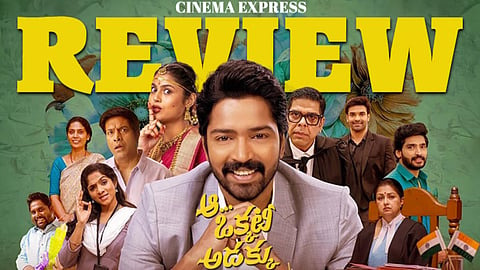

HYDERABAD : Somewhere in the beginning of Aa Okkati Adakku (AOA), a banter ensues between Gana (Allari Naresh) and his sister-in-law Devi (Jamie Lever). There are lines thrown around on how Gana hasn’t lost his sense of humour even though he has become more serious lately. This is followed by a discussion about the need for a person to possess ‘content’, whether it is serious or funny. The meta nature of this exchange is not lost on the audience. After headlining back-to-back films (Naandhi, Ugram, Itlu Maredumilli Prajaneekam) that have marketed themselves upfront as social dramas with action, Allari Naresh seems to have returned to the screens with what looks like a comedy. By slyly acknowledging the fact that one can be funny despite adopting seriousness with age, we get the mission statement of AOA, which tries hard to maintain the balancing act. The result is a middling, ill-fitted mess.
Naresh plays Ganapathi alias Gana, a middle-aged government employee. After a stable job and a house of his own, all he needs now is a wife to complete the ‘well-settled’ trifecta. Playing a character close to his real-life age, much like Venkatesh’s Pellikani Prasadu from the iconic comedy Malliswari (there is also the ‘naku caste feelings levu’ dialogue in common between both films), Naresh is the butt of his neighbours’ jokes, while being a source of concern for his family. Unlike Prasad from Malliswari who lives with his older brother and sister-in-law, what adds salt to Gana’s injuries is the fact that it is his younger brother who is married with a kid. Surely enough, there is a sanctimonious backstory that explains why Gana has no luck in the arranged marriage market, but more on that later. Writer Abburi Ravi also uses the initial portions of AOA to establish the conservative expectations that surround the theatre of Indian marriage. On one hand, single women who consider joint families as deal breakers for marriage are bemoaned, while divorcees are tastelessly referred to as ‘second-hand goods’.
Once Gana gets tired of neighbourhood aunty matchmakers, he decides to take the matrimonial service. Through them, Gana meets Siddhi (Faria Abdullah). There are motions of a courtship, till the story prefers to devote its runtime towards exposing the scams that operate behind matrimonial sites. While the film’s comedy is not the smartest or the funniest, it does keep things in an easygoing fashion. Jamie Lever, Harsha Chemudu and Hari Teja’s characters in particular contribute to this lightness during their limited screen time, keeping things pleasant.
The second half of the film lets go of the few merits from the first half into directions more serious and dare I say, unmemorable. After Siddhi rejects Gana’s proposal for marriage, they meet again and instantly strike up a friendship. There are three songs to detail the progression of Gana and Siddhi’s semi-platonic relationship, who are in their early 40s and mid-20s, respectively. It is odd that a film not shy of displaying the age gap between its leads refuses to ever address it. There is a laundry list of superficial remarks playing out on how divorcees, middle-aged men, NRIs, unemployed men, men with loans, men with families, female doctors, female influencers and women who sound like men fare in the marriage market, but nobody in this universe finds anything wrong with really young women paired with an older man.
For a film so filled with opinions, it seems odd that there is no commentary on this awkward situation. Now, there are ulterior motives behind Siddhi pursuing Gana, but what does Gana feel about dating women half his age? These questions echo in the vacuum that exists where Gana and Siddhi’s chemistry should have ideally been.
The film’s warning cries on scammers, packaged into a drama, is equally hollow. I wish I could say I pondered about why the characters behaved the way they did, but I kept glossing over the details, hoping the film does get better as it goes. Different details of the film are thrown around like breadcrumbs and by the time you reach the end, the pay-off is not just unsatisfying, but also half-baked. A runaway groom (Raja Chembolu) and a hit-and-run victim (Goparaju Ramana) are a few examples of how the film’s subplots are given the appearance of something serious while they remain wafer-thin.
The film’s final block, a courtroom drama, ideally an event that should give some meaning to what has happened so far, turns into exactly the opposite — a reflection of the film’s lacklustre writing. It was so hamfisted, that it makes one wonder why we had any expectations in the first place. Allari Naresh and Faria Abdullah shine intermittently, and the joke is on us for believing the film could be anything more than that.
Film: Aa Okkati Adakku
Cast: Allari Naresh, Faria Abdullah, Jamie Lever, Hari Teja, Viva Harsha, Vennela Kishore, Ariyana Glory
Director: Malli Ankam
Rating:2/5